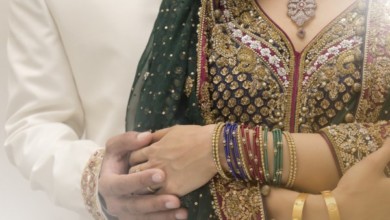The Mercy of Touch: Nonverbal Love in Islam

By Hatmah Nalugwa Ssekaaya
Assalam alaykum warahmatullahi wabarakatuh
My Parents have been married for close to 45 years. What strikes me most about them is not what they say to each other, but what they don’t say. One evening as my mom poured tea, she gently placed her hand on her husband’s shoulder. He looked up and smiled, as if those few seconds carried an entire conversation. Later, as he walked across the compound, she instinctively adjusted his scarf without a word.
Subhana Allah! In that silence, I witnessed a profound truth: love is often spoken not through words, but through touch.
The Sunnah of Affection
The Prophet (PBUH) was not shy about expressing tenderness. Aisha (RA) narrated:
“The Prophet (PBUH) would recline on my lap and recite Qur’an while I was menstruating.” (Bukhari, Muslim)
This simple, intimate act shows his comfort and closeness with her—an affection that didn’t need grand words.
In another narration, Aisha (RA) said:
“I would drink from a cup while menstruating, then give it to the Prophet (PBUH), and he would place his lips where mine had been and drink.” (Muslim)
Think about it—such subtle gestures communicated deep love, tenderness, and acceptance. These nonverbal acts are part of the Sunnah, teaching us that affection is not only permissible, but recommended.
The mercy in simple gestures
Consider how powerful simple gestures can be:
- Holding hands while walking together.
- A gentle pat on the back when encouraging your spouse.
- Sitting close during a family gathering, quietly affirming, “You’re my person.”
- Brushing dust off their clothes or serving them food with your own hands.
These are not trivial but rather they are acts of mercy. In fact, the Prophet (PBUH) said:
“Anything you spend for Allah’s sake will be rewarded, even the morsel of food you put in your wife’s mouth.” (Bukhari, Muslim)
When words fail, touch speaks
Every marriage faces moments of tension. Sometimes, words make things worse. But a soft touch can disarm anger in a way arguments never could.
You the wife placing your hand on your husband’s arm while saying, “Let’s not fight”, or a husband embracing his wife after a misunderstanding. These gestures lower defences and remind both hearts that love still underlies the frustration.
In fact, research shows that physical touch releases oxytocin—the “bonding hormone”—that softens anger and fosters trust. Isn’t it amazing how Allah built this mercy into our very own bodies?
Creating rituals of touch
Just as couples can have inside jokes or special phrases, they can also create rituals of touch:
- Greeting each other with a hug when one arrives home.
- Holding hands during du‘a after prayer.
- A light kiss on the forehead before sleep.
- A playful nudge when laughing together.
These rituals become little anchors in the marriage—predictable moments of tenderness that reassure both partners.
Every morning before Mwami Ssekaaya leaves for work, we share a simple du’a together while holding hands. Over the years, this has become our ritual, and now, even when we quarrel, we refuse to skip it.
Respecting boundaries in public
While Islam encourages tenderness, it also teaches modesty and dignity. The Prophet (PBUH) was affectionate with his wives but without being indecent in public. This balance is key.
Holding your spouse’s hand while walking, offering a seat, or helping them carry something, all of these are public acts of affection that uphold dignity while still making your spouse feel cherished. Excessive displays, however, belong in private.
Healing through touch
Never underestimate how healing touch can be. A tired wife who receives a reassuring embrace feels lighter. A stressed husband whose wife massages his shoulders feels renewed. Sometimes, you don’t need to solve your spouse’s problems—you only need to hold them while they weather the storm.
A scholar once said: “The heart that is comforted at home will have the strength to face the world.” Be that comfort for your spouse. Let your touch remind them: “You are safe here. You are loved here.”
Touch as Worship
When done with the right intention, even the smallest affectionate gesture can be ibaada. Holding your spouse’s hand with the intention of mercy and companionship can earn you Allah’s pleasure. Smiling at them is charity. Serving them with your own hands is Sunnah.
Imagine standing before Allah on the Day of Judgment and finding mountains of reward—not because of lengthy actions, but because of the quiet mercies you showed your spouse through touch.
So, this week, try this: find one way to communicate love to your spouse without words. Hold their hand, serve them food, or simply sit close in silence. Let your actions speak the language of mercy. Because when touch is filled with sincerity and love for Allah’s sake, it is not just affection—it is worship.






